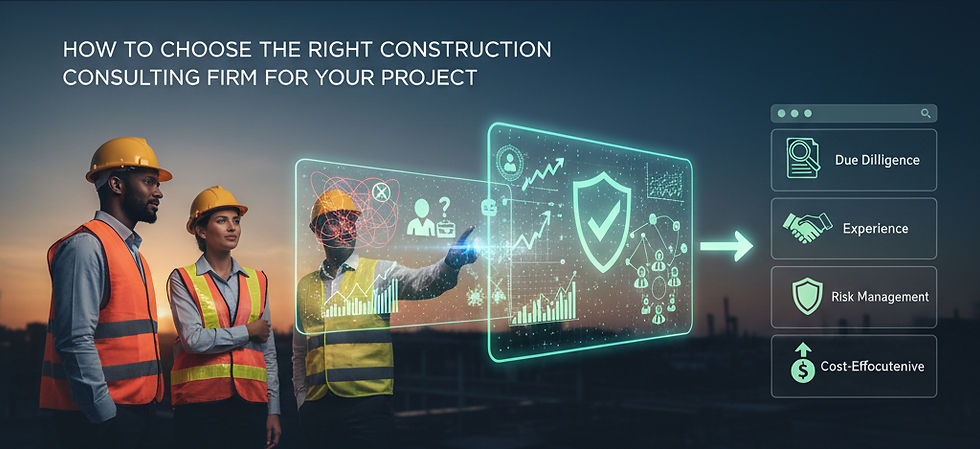7 Mistakes to Avoid When Hiring a Construction Consulting Firm
- Daphne Garcia
- Oct 7, 2025
- 4 min read
Engaging a construction consulting firm can be transformative for a project’s success, yet many organizations stumble by overlooking crucial factors. A proper construction consulting partner brings technical expertise, strategic planning, risk mitigation, and compliance oversight.
But missteps—such as failing to vet credentials, relying solely on price, or ignoring communication protocols—can lead to delays, budget overruns, or even legal trouble. Understanding common pitfalls helps ensure a successful collaboration with a construction consulting company that aligns with project goals.
Skipping Thorough Research and Due Diligence
Selecting a construction consulting firm without diligent research is one of the most common missteps. Prospective clients should investigate reputation, track record, and relevant expertise. Simply opting for the first result in a search or a referral can result in misaligned expectations or a consultant who lacks the necessary experience. Being aware of the 5 Common Challenges in Construction Projects and How to Overcome Them can also guide clients in choosing a firm equipped to handle these issues effectively.
A helpful step is to explore multiple construction consulting firms through case studies or testimonials, verifying experience in similar project types and sectors. Clients who take time to review qualifications are more likely to find a reliable partner who can support their long-term project objectives.
Choosing Based Solely on Price
Price is often a tempting criterion, but selecting a construction consulting company purely on cost can be detrimental. Low bids might indicate inexperience, substandard methodologies, or hidden fees down the line.
Instead, value a consultant’s depth of services—whether it's risk assessment, budgeting, or scheduling—and weigh it against capabilities. This is particularly vital when seeking construction services that span strategy, compliance, and stakeholder coordination.
Neglecting Credentials, Licensing & Insurance
Another common failure occurs when credentials aren’t verified. A reputable construction and consulting company should provide proof of licensing, bonding, and insurance. Without these safeguards, clients risk liability for accidents, code violations, or incomplete work.
Verifying these credentials ensures legal compliance and protects against unforeseen liabilities during project execution. It’s wise to request documentation before signing any agreements.
Proceeding Without a Detailed Written Agreement
Relying on handshake deals or verbal understandings is a recipe for confusion. A comprehensive written contract outlining scope, deliverables, timelines, payment schedule, change mechanisms, and warranties is critical. For guidance on making informed decisions, see How to Choose the Right Construction Consulting Firm for Your Project, which provides key considerations to ensure alignment and project success.
A clear agreement not only manages expectations, but also serves as a protective foundation if disputes arise. For a construction consulting firm, a contract aligned with the client’s priorities sets a professional tone from the outset.
Lacking Contingency Planning or Clear Budget Controls
Construction projects inherently involve uncertainties. Overlooking contingency planning—or budgeting without transparent escalation protocols—can lead to unexpected costs and schedule disruptions.
A robust construction consulting firm should include contingency allowances, change-order protocols, and milestone-linked budgets. This ensures financial clarity and keeps all parties aligned if conditions change mid-project.
Ignoring Communication and Professional Presence
Strong communication is the backbone of effective construction consulting. Mistakes often emerge when consultants are unresponsive, disorganized, or missing a professional presence.
Clients should prioritize a partner who offers consistent contact, assigns a point person, and uses reliable channels for status updates and issue reporting. Clear communication expectations foster trust and mitigate misunderstandings. Understanding The Benefits of Hiring a Construction Consulting Firm for Your Next Project can further highlight how professional guidance enhances efficiency, reduces risks, and ensures successful project outcomes.
Failing to Check References or Past Performance
Everyone promises greatness—few deliver it. A proven construction consulting firm should connect clients with references and provide evidence of successful project outcomes. Checking reviews, past client feedback, and onsite performance can reveal hidden strengths or warning signs.
Asking for references and, when possible, visiting previous job sites provides insight into work ethic, professionalism, and real-world outcomes.
Quick Comparison of Common Mistakes and Best Practices
Common Mistake | Recommended Approach |
Skipping vetting/research | Verify reputation, credentials, and case studies |
Choosing purely on price | Balance cost with quality, experience, and scope |
Avoiding documentation | Insist on a detailed, written agreement before starting |
Lack of contingency plan | Include budget and schedule buffers upfront |
Weak communication | Establish contact points, regular updates, and presence |
Ignoring references | Check past performance and speak with previous clients |
Frequently Asked Questions
1. How much should one pay upfront for a construction consulting firm?
Firms typically request a small deposit—often 10–15%—with the rest tied to milestones. Excessive upfront fees may indicate potential risks.
2. What documentation should a client require?
Proof of licensing, liability insurance, workers’ compensation, a detailed written agreement, and contingency protocols are essential.
3. How can one verify a firm’s reputation?
Request client references, review similar past projects, and evaluate the firm’s history in managing complex construction projects.
4. Can a consultant operate without a physical office?
While some may work virtually, lack of professional presence—like a business address or official website—can make escalation and accountability difficult.
5. Are low-cost firms always risky?
Not always, but extremely low bids often suggest inexperience or future cost creep. Balance cost considerations with credentials, method, and communication quality.
Conclusion
A well-selected construction consulting firm can ensure project success by managing complexity, controlling risk, and delivering expert guidance. By avoiding the seven mistakes mentioned—neglecting due diligence, over-prioritizing price, skipping credentials, ignoring written agreements, failing to budget contingencies, tolerating poor communication, and overlooking references—organizations can secure a trustworthy and effective partner.
At the heart of the region, Tripe G Enterprises stands ready as trusted construction consulting firms in San Antonio, offering tailored expertise, transparent processes, and steadfast support through every project phase.

![MASTER LOGO 3G ENTERPRISE TEXAS LOGO LINE NO ENTERPRISE ONLY FINAL DESIGN PDF [Recovered]_](https://static.wixstatic.com/media/2785d0_6d5e092063c24e2e9876a02dacb2e3e9~mv2.png/v1/fill/w_121,h_109,al_c,q_85,usm_0.66_1.00_0.01,enc_avif,quality_auto/MASTER%20LOGO%203G%20ENTERPRISE%20TEXAS%20LOGO%20LINE%20NO%20ENTERPRISE%20ONLY%20FINAL%20DESIGN%20PDF%20%5BRecovered%5D_.png)




Comments